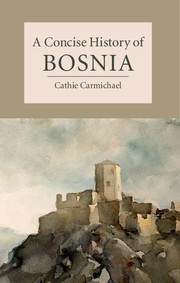Book contents
- Frontmatter
- Contents
- List of figures
- List of maps
- Acknowledgements
- Preface
- Chronology of events in Bosnian history
- 1 Introduction
- 2 Bosnia, Hercegovina and the Ottoman Empire (1463–1912)
- 3 Rebellion, war and the Habsburgs (1875–1918)
- 4 Royalist Yugoslavia, the Independent State of Croatia and the Second World War (1918–1945)
- 5 Bosnia and the Communist experiment
- 6 Bosnian independence, war and genocide
- 7 Conclusion: ‘unmixing’ Bosnia and Hercegovina
- Bibliography
- Index
4 - Royalist Yugoslavia, the Independent State of Croatia and the Second World War (1918–1945)
Published online by Cambridge University Press: 05 July 2015
- Frontmatter
- Contents
- List of figures
- List of maps
- Acknowledgements
- Preface
- Chronology of events in Bosnian history
- 1 Introduction
- 2 Bosnia, Hercegovina and the Ottoman Empire (1463–1912)
- 3 Rebellion, war and the Habsburgs (1875–1918)
- 4 Royalist Yugoslavia, the Independent State of Croatia and the Second World War (1918–1945)
- 5 Bosnia and the Communist experiment
- 6 Bosnian independence, war and genocide
- 7 Conclusion: ‘unmixing’ Bosnia and Hercegovina
- Bibliography
- Index
Summary
THE NEW YUGOSLAVIA
In 1918, the Allies accepted the right of the enemies of the Habsburgs, the Serbian Karadjordjević Dynasty, to create a new state. Many South Slav intellectuals had wanted a union of the peoples who spoke the shared language of the region, but as a union of equals. The creation of a Royalist Yugoslavia that included all of Bosnia and Hercegovina was a radical departure, but for the 23 years of its existence it was weighed down by the past. Initially named the Kingdom of Serbs, Croats and Slovenes, it was known unofficially as Yugoslavia from the outset (and officially by 1929). That the Karadjordjević Dynasty was Serbian and Orthodox mattered to the Muslim and Catholic peoples in Bosnia. For decades they had effectively been ruled from Vienna, and the Austrian regime had retained the privileges of property holders. If the spark that lit the First World War had been fuelled by the poverty of Bosnia's Orthodox community, then the establishment of a Serbian king in power was a kind of nemesis for the remnants of an Ottoman ruling class that had been propped up by the Habsburgs. Land in Bosnia was radically redistributed, leaving many Muslim families facing poverty after 1919. This created a crisis of self-esteem and purpose as well as financial difficulties among Muslims, used for centuries to owning the land.
Being part of Yugoslavia brought some clear benefits, but also disadvantages to Bosnia. Aleksandar Karadjordjević was a brave man who had led the Serbian army into battle during the war, but he had distinctly authoritarian personality traits. He was a personal friend of the Croatian Peasant Party (Hrvatska seljačka stranka, HSS) leader Stjepan Radić and sincerely tried to represent the cultures and traditions of all the peoples. However, he had been the head of state of their official enemy when Bosnians had fought in the Austrian army against their southerly neighbours, and divisions of that magnitude were not easily erased by state policy.
- Type
- Chapter
- Information
- A Concise History of Bosnia , pp. 60 - 94Publisher: Cambridge University PressPrint publication year: 2015



